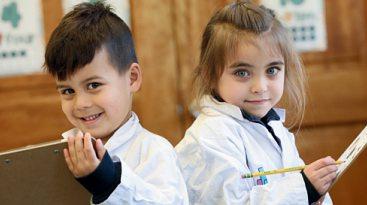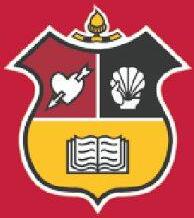












































by Susan Shultz
For the past two decades, the Seven Angels Theatre in Waterbury has celebrated the High School Halo Awards By doing so, the theatre rewards and elevates over Connecticut high school theatre programs in all aspects: actors, singers, technical crew, directors, and more.
The history behind the awards began in , when Seven Angels Artistic Director Semina DeLaurentis created the Seven Angels Theatre High School Halo Awards, a program that celebrated high school theatre in the immediate region The original program included eight schools, and the
ceremony was held at Seven Angels Theatre.
Over the years, the program grew too large to be held at Seven Angels and eventually transferred to the Palace Theater in Downtown Waterbury Since then, the program has grown from one night of awards to two nights of awards and is now the powerhouse that it is with four nights of awards and over participating high schools from across the State of Connecticut.
Many theater departments embrace these awards as a way to exhibit and reward their student performers
Wooster School’s theater program made its debut in the Halo Awards in 2020. In the past five years, the school’s talented students have received 90 nominations across categories. Wooster’s learner-centered ethos allows students to discover the joy of performance.
Students gain confidence, learn to understand and connect with others through empathy, and experience a sense of their own belonging. This program helps students find meaning by bringing stories to life, finding their unique voice, and creating beauty. >>
>> Franklin Academy takes great pride in its vibrant and dynamic Performing Arts program, a cornerstone of student life and a signature offering at the school
Each year, an impressive 40% of the student body participates in musical theater productions, whether on stage in the spotlight or behind the scenes managing the intricate details of technical production. This high level of involvement reflects not only the students’ passion but also the school’s commitment to cultivating creativity, collaboration, and confidence.
A testament to this dedication is Franklin Academy’s active participation in the prestigious Halo Awards—an annual event that recognizes excellence in high school theater across Connecticut. Franklin students regularly submit their productions for consideration, celebrating their hard work, talent, and artistic achievement among peers from across the state.
Leading the charge is Arts Department co-chair Matt LandryMcWilliams, affectionately known within the Franklin community as the “pied piper” of the performing arts Under his inspired leadership, the program continues to grow in scope and ambition. LandryMcWilliams frequently brings in Broadway-caliber professionals to assist with set design, choreog-
raphy, and technical production, providing students with real-world insight and elevating the caliber of every performance.
Tickets for this year’s awards can be purchased at WWW.PALACETHEATERCT.ORG l H
At Franklin Academy, the Performing Arts are more than extracurricular—they are a stage for self-expression, growth, and excellence.



by Susan Shultz

Asspring begins to lure New England under its spell, young and old alike are eager to get out into the elements and enjoy growth and renewal. Connecticut schools are making more use of their outdoor spaces every year whether its to conduct open air classrooms or teaching students of all ages how to respect and resource the earth. Several local districts and schools have formal programs teaching life lessons via the world’s oldest and most consistent teacher, Mother Nature.
MAY 21, 2025 |6:30PM-8:00PM
Registeratsjcadets.org/visit

Immerse yourself in ourrigorousacademicprograms,discoverour wide rangeofextracurricular activities, andlearn aboutthe values thatshape our exceptionalCatholic, co-ed, college preparatory learning community!
Nearly760 SJ Cadetsfrom36towns seek outtheir talents andthrivewithconfidenceeach andevery day.
25 AP,ECE,and EarlyCollege Courses Theaverage SJ student earns6college credits
88% of studentsplayonatleast 1 of 50 teams. The Class of 2025 hasalready signed19letters of intent for Division I, II,and IIIcollegiateathletics, with an additional signingday scheduledfor May.
Cadetsare giventhe opportunitytoexplore their hobbies andinterests in 40+ clubs andactivities
Cadetsvolunteer an averageof36,000 hoursof service annually,positively impacting localschools, pantries, andnursinghomes.
100% of SJ studentsare accepted to college. The Classof2024 earned more than $38 millionin scholarship awards.

St.Joseph High School 2320 Huntington Tpke Trumbull, CT 06611 www.sjcadets.org admissions@sjcadets.org









by Susan Shultz
While formal education via class courses and curriculum requirements prepare students for academic challenges in college or whatever lies ahead, Connecticut schools sometimes require service hours to graduate These service hours vary by amount and definition as per the individual district or
private school policies Public schools often allow students to begin logging in community hours shortly after eighth grade graduation Other schools only require service hours for National Honor Society candidates but encourage all students to serve in their local communities
Upper School students complete designated hours to support social justice and community service efforts. Embracing the spirit of the Goals and Criteria, service becomes a habit of the heart, and students often surpass the minimum requirement of hours.
Sacred Heart Greenwich believes in students committing hours for both direct service as well as general service hours.
Through their learning experiences, students develop a passion for exploring the root causes of social injustices. They are not only committed to working toward systemic change and eradication of these injustices but also approach their efforts with empathy and compassion for those affected
For direct service, students are working directly with a population in need. This year, for example, students delivered food and clothing directly to the homeless in NYC, as well as worked one on one with special needs children.
Sacred Heart Greenwich also holds an annual Community Day of Service that truly reflects our commitment to fostering social awareness which impels to action. This year we honored our Veterans by collecting and packing essential housewares to help with the transition into new homes. This act of service was a tangible way for us to show our gratitude for their sacrifices in serving our country.
In Grades 8-12, Sacred Heart Greenwich offers our students the chance to join experiential learning opportunities through Service Trips. These trips combine a robust leadership curriculum with immersive travel experiences and partnership-based service projects. Through their participation, our students will develop essential leadership skills and gain invaluable real-world experience to prepare them for future success, all while giving back. Service trips are in locations such as Lourdes in France, Peru, and Pine Ridge in South Dakota.
SERVICEREQUIREMENTSFORGRADUATIONINCLUDE:
9th Grade (Freshman): 12 hours of direct service to a population in need.
10th Grade (Sophomore): 20 hours of service, 15 hours of direct service to a population in need.
11th Grade: 12 hours of direct service focused on a single organization.
12th Grade: 15 hours of service. Seniors are encouraged to find an organization they have a passion for and dedicate their service hours to.
Sr. Sheehan Service Honor Society recognizes students who have demonstrated a deep commitment to service and a desire to advocate for the poor and marginalized. Students who satisfy the requirement are inducted in the spring of their junior year >>
CHESHIRE
>> The motto at Cheshire Academy is “Ich Dien,” or “I serve,” so this concept is embedded into the school’s DNA.
As an internationally minded school that challenges students to maximize their potential and thrive as global citizens, service projects are built into Cheshire Academy’s programming. These range from beach cleanups to volunteering at local food banks and nonprofits to helping animals with special needs at Perfect Imperfections.
These activities are not a requirement, and yet, the school sees regular involvement and student sign-ups as they offer multiple service opportunities each month.
However school districts incorporate service hours, it is clear it is a win/win situation for all—building a better moral foundation while also building a better community in which to thrive. l






















































































Nestled within the school campus, the CAS Grows Garden is more than just a place to grow fruits and vegetables, it’s a vibrant, hands-on learning space where students cultivate curiosity, teamwork, and a deep appreciation for nature.
This unique outdoor classroom provides an engaging environment where children can explore the wonders of gardening, from planting seeds to harvesting nutritious produce, all while developing important life skills. As a special touch, visitors to CAS are gifted seeds to plant their own flowers at home, serving as a lasting reminder that CAS is “Planting Seeds of Faith, Knowledge & Service.”

Established in 2021, the CAS Grows Garden gives everyone an opportunity to get involved with hands-on, age-appropriate exercises that make learning about nature and growing food fun! Student gardeners plant seasonal vegetables from seed, and learn how to take care of the plants as they grow—all the way to enjoying them at harvest time. They learn about flowers and insects and their roles in the systems of the garden, as well as the various plants’ needs, soil health, fantastic fungi, and the nutritional benefits of the fruits and vegetables that they grow.
CAS students create the art that decorates the landscape, hear stories from their outdoor library of garden-themed books play informational games, do scavenger hunts, design educational posters, sample smoothie and salad recipes, and engage in a whole host of other beneficial activities such as breathing exercises and journaling. They even created their own unique garden holiday that the school celebrates every spring!
Students are encouraged to work as a team, be creative, and ask questions. They utilize science and math, fine and gross motor skills, and all five senses. The CAS Grows Garden aims to plant the seeds of healthy bodies, minds and spirits, and strengthen students’ wellbeing through discovery, gratitude, movement, fresh air, curiosity and camaraderie with nature. >>






































































>> At Franklin Academy, education goes far beyond the classroom. One of the school’s most distinctive and hands-on offerings is its signature Animal Sciences program, which blends academic exploration with real-world experience. Through a unique collaboration with Ray of Light Farm, an animal sanctuary just across the street, and the use of Franklin’s own on-campus farm, students gain meaningful opportunities to immerse themselves in the study and care of animals.
The Animal Sciences program introduces students to a rich and evolving curriculum that includes anthrozoology, animal husbandry and behavior, sustainable farming, conservation and rehabilitation. These areas of study not only spark intellectual curiosity, but also foster empathy responsibility, and a deeper appreciation for the interdependence of humans and animals.
Whether they’re tending to chickens in the schoolyard coop, studying animal behavior in the sanctuary barn, or exploring the ethics of animal care, Franklin students are constantly learning by doing. One of the most memorable recent moments came when students assisted in the birth of goat triplets—an unforgettable, hands-on experience that brought their studies to life in the most literal sense.
“Our students aren’t just reading about animals— they’re building relationships with them,” said one Franklin science teacher. “They’re learning how to listen, observe nurture and support. These are skills that extend well beyond animal care; they’re foundational for life.”
Thanks to the partnership with Ray of Light Farm, students are able to interact with a wide range of animals—from horses and goats to peacocks and llamas—all while learning about the mission of animal rescue and rehabilitation. The sanctuary provides a safe haven for animals in need and an educational space

where Franklin students can contribute meaningfully to their care and recovery.
This program is a perfect reflection of Franklin Academy’s commitment to experiential learning, where passion and purpose meet in every lesson. As students explore the bonds between humans and animals, they’re not just preparing for future careers in veterinary science, wildlife conservation, or agriculture—they’re becoming stewards of a more compassionate world.
And with spring in full swing and baby animals arriving, there’s never been a better time to witness the magic happening at Franklin Academy’s farm After all, it’s not every day a student gets to help deliver goat triplets before second period.
Regardless of the area, it is clear that students all over the state are enjoying the lush spring outdoors that Connecticut has to offer, and translating that into a well-rounded, holistic learning experience.
CONTINUES ON PAGE 10






Sacred Heart Greenwich is dedicated not only to academic excellence and artistic growth but also to fostering a learning environment that values and respects the natural world. Its beautiful 110-acre campus provides a dynamic backdrop for student development, featuring an outdoor classroom, a vegetable and herb garden, a greenhouse, pond with observation bridge, and the Audubon Society Meadows
Guided by the school’s Goals and Criteria, Sacred Heart’s community is committed to caring for its common home, the Earth. Students recognize the significance of God’s creation and strive to use their campus and resources to support both local and global ecology As stewards of the environment, faculty, staff, and students are called to transform knowledge into meaningful action, promoting sustainability and the protection of natural resources.
Some of the programs that embrace and enhance the natural beauty of Sacred Heart Greenwich’s outdoor spaces include:
This spring program designed for parents and their toddlers (18 months-3 years old) is an engaging, hands-on exploration with endless discoveries in nature. Set on Sacred Heart Greenwich’s stunning 110-acre campus in full spring bloom, each week brings a new adventure—whether it’s splashing in the mud kitchen, planting and picnicking in the garden, exploring the outdoor classroom, or visiting the campus beehives to meet its busy bees!
Sacred Heart Greenwich has created a dedicated instructional space for its Lower School (Kindergartenfourth grade) to learn in the open air. The overarching theme centers on learning experiences that take place in the outdoors, are about the outdoors and are inspired by the outdoors. Located just outside of the Lower School entrance, it is easily accessible and visible to both classes throughout the day Students benefit in mind and body from interacting with nature

Students spend quality time in this outdoor classroom as well as the other green spaces on campus, gaining an appreciation for the natural world, experiencing multisensory stimuli, and reducing stress. Teachers extend curriculum-based instruction and joyful pursuits to the outdoors in this living, changing, and stimulating natural environment. Time outdoors offers a full-body break from the routine and often provides renewed focus upon return to the classroom.
Through this Lower School program, children enjoy many opportunities to walk around the beautiful campus garden and greenhouse, observing, exploring, and discovering the world around them. They may want to learn more about the leaves in fall, or perhaps how trees change through the seasons. Their interests inspire and guide our learning journeys. The community actively, excitedly, and gratefully embraces the vast natural world right outside its door. The children bring their treasures back to the classroom, and that leads to counting, comparing, observing, and experimenting It serves as a springboard for projects: it serves as a springboard to knowledge.
During the spring months of the fifth grade, the girls study botany in science class. The unit starts with germination, which is the process of a seed developing into a young plant. Seeds are planted in the classroom, and the girls care for them and watch them grow into seedlings. The anatomy of a flower, the process of photosynthesis, and pollination are also explored. As the weather warms, the garden becomes central to the unit.
The beds are prepared, and crops, as well as the seedlings from the classroom, are planted. The girls care for the garden until the school year is completed. When the girls return to school in September as sixth graders, they see the result of their hard work and effort which is a beautiful garden. The girls harvest what they planted and donate the proceeds to an organization called Meals on Main Street in Portchester, New York. >>




>> In celebration of Earth Day and to inform the community about the plants in the Sacred Heart Greenwich meadows, vegetable and herb gardens, Foundations of
Art students create ceramic tiles that will be hung on stakes to label where seeds are planted in the gardens. Students carve and sculpt clay to create relief plaques illustrating tomatoes, peppers, lettuce, zucchini and more.
Outdoor learning is an integral part of the Ridgefield Academy/Landmark Preschool student experience across all grade levels. The outdoor classroom, complete with natural seating, reflects the school’s commitment to open-walled learning and is used regularly by students and teachers alike.
The campus itself serves as a living laboratory, where even the school’s youngest learners embark on nature walks and older students engage
in age-appropriate explorations such as identifying invasive species.
Additionally, the garden adjacent to the Preschool and Lower School building provides a dynamic space for cross-curricular learning. Activities like planting, tending, and observing not only support hands-on instruction but also spark curiosity and nurture a deep appreciation for the natural world, helping to cultivate future environmental stewards
“In Cheshire Academy’s back campus, there are community garden patches and plots adjacent to the school pond and woodland trails, which students and faculty attend to on various occasions throughout the year,” said Dean of Academics Marc Aronson
“Classes from International Baccalaureate (IB) Environmental Systems and Societies to Higher Level Literature, among others, can be seen out and about on campus,” he said Aronson added that soil and water samples are collected and analyzed from the Honeypot Brook, which runs through the back campus.
“Students explore the genetic concept of extended phenotypes to discover the interconnectedness of all life while analyzing Romantic era poetry,” Aronson said. l

EagleHillSchool,locatedin theheartofGreenwich, Connecticut,offersalife changingexperiencefor childrenwithlanguage-based learningdifferences.
CHESHIRE



eaglehillschool.org KaraAshley-DirectorofEnrollment k.ashley@eaglehill.org 475-303-3437









by Susan Shultz
Learning good habits to reduce waste and be mindful of the trash we leave behind is important at any age. But instilling those habits in young people could mean a lifetime of making positive change Also, eaten food that’s grown or harvested sustainably can also make a difference. Many Connecticut schools are trying to make these positive changes in an area where the most waste can occur – the schools’ cafeteria Whether it be disposable utensils, paper napkins or wasted food, small efforts can leave a big impact on a school’s footprint and legacy >>


Health &Consulting specializes in evidence-based treatments forindividuals with Autism Spectrum Disorder (ASD)and related neurodevelopmental disabilities. Services include: educational programming, individual andfamily therapy, parent training, school consultation, andin-homeand center-based services. With acompassionateand multidisciplinaryapproach, Solsticefocuses on empowering families while promoting independence andinclusion. Theypride themselves on little to no wait times andaccept most insuranceplans, ensuringaccessible andhigh-qualitycare.





























>> At Ridgefield Academy, the school community prioritizes sustainability in their cafeteria. They source organic and locally produced food whenever possible from trusted suppliers such as Hickory Farms, Arethusa Dairy Farm, and Baldor Specialty Food
Ninety percent of the school’s hot offerings are made from scratch in its kitchen and served on reusable items, with no single-use plastics.
Additionally, Lower School students participate in a Food Waste Unit, where they learn about the capital, natural, and human resources required to produce their meals They actively engage in practices to reduce food waste on campus, including recycling, taking only what they will eat, and educating their classmates on making mindful choices to minimize waste.
This year, Cheshire Academy began a composting program in cooperation with FLIK Dining and Boulder Knoll Community Farm in Cheshire.
Each day, fruit and vegetable food scraps that have not been put on plates are set aside Mon, Tues, Thurs., and Fri, Roula [from Flik Dining] brings them to her farm and feeds her chickens (and possibly other animals).
“On Wednesdays, I bring the food scraps to Boulder Knoll Community Farm and leave the food there. I believe FLIK weighs the bags, but I estimate that the bags are between 10-20 lbs. each, which means that we're diverting approximately 50-100lbs of food waste a week and it's being composted,” said Katie Cooper, English Teacher and Sustainability Coordinator for Cheshire Academy
“We do many things to divert waste, like donating to local food banks. We have also started collecting bottles and cans around the campus which I bring to be recycled,” Cooper said.
Other sustainability efforts are held during Cheshire Academy’s Service & Sustainability Weekend These include constructing and hanging bat houses on campus and hosting a clean-up at the Farmington Canal with Save the Sound. Students also partner with Temple Beth David to volunteer at their Community Garden.
In 2018, Wilton Go Green partnered with Wilton Public Schools to embark on a journey with the Zero Waste Schools program This journey empower students and staff to promote environmental consciousness and reduce waste in school cafeterias. Students have been helping divert tons of recyclable material and food scraps to composting, as well as rescuing food for donation ever since
Last summer Wilton Go Green, with the support of the WPS launched a Sustainable CT Community Match fundraiser to help Cider Mill School install a dishwasher. These funds were also used to purchase stainless steel reusable trays, and other essential equipment to move away from single-use products in alignment with that dishwasher purchase.
The Wilton community donated over $7,500, which, when matched by Sustainable CT, enabled WPD to make the necessary purchases to bring a reusable program to students this school year.
Cider Mill students have been using reusable stainless-steel trays, forks and spoons since November—eliminating over 50,000 disposable trays and cutlery from going into the trash.
Wilton High School students began their reusable utensil program this year. Last year, a WHS junior worked with state officials to secure funding for his $20,000 project under the American Rescue Plan Act (ARPA). The funds were used to purchase and install a dishwasher and purchase reusable utensils.
As a result of these programs, 131,040 single-use plastic utensils (1,114 pounds of plastic) will be eliminated from the waste stream every year, and $5,707 will be saved annually from not repurchasing disposable utensils, according to Wilton Go Green President Tammy Thornton.
WPS partnered up with Plastic Free Restaurants, a 501(c)3 non-profit. This non-profit’s mission it is to reduce single-use plastics in schools and restaurants. The organization donated reusable utensils for Miller-Driscoll, Cider Mill and Wilton High School, through their subsidy program. MillerDriscoll school began using reusable forks and spoons in their cafeteria on the first day of this school year thanks to an already existing dishwasher in their kitchen. l















•Specializing in earlyeducation, age2-grade5
• Specializinginearlyeducation, age2-grade5
• Nurturingintellectualcuriosity,collaboration, andcreativeexpression
• Nurturingintellectualcuriosity, collaboration, and creativeexpression
• Inquiry-based, experientiallearning
•Inquiry-based, experientiallearning
• Individualizedinstruction
•Individualized instruction
• Lowstudenttoteacherratios
•Low studentto teacher ratios


• Adiverseandglobally inclusivecommunity
•A diverseand globally inclusivecommunity
• NestledinN.Stamford-stepsfromBedford,Pound Ridge, Greenwich, and New Canaan
• NestledinN.Stamford—steps from Bedford,Pound Ridge, Greenwich,and New Canaan Where young students grow,thrive, and developa lifelong love of learning
TheLongRidgeSchoolsetthestandard fortherestofmychildren'seducational journeys.Heretheydevelopedthelove oflearningandhowtorespectandbe respected.
